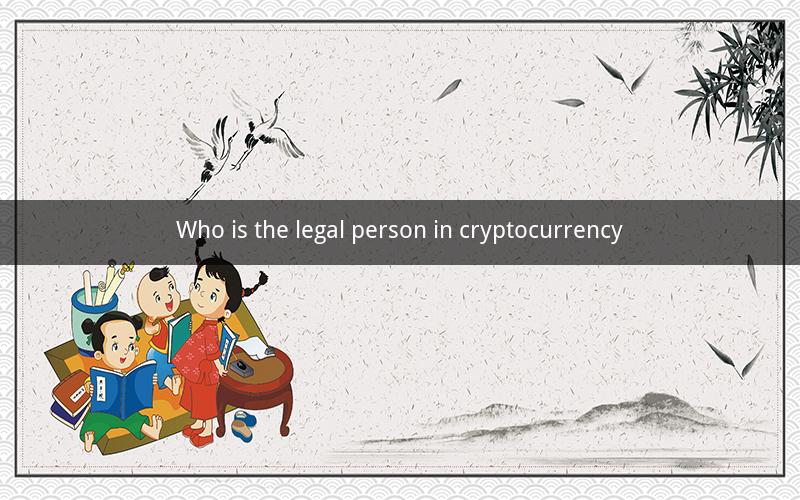
Contents
1. Definition of Legal Person
2. Understanding Cryptocurrency
3. Legal Person in Cryptocurrency
4. Jurisdictions and Legal Frameworks
5. Legal Challenges
6. Case Studies
7. Future Outlook
---
1. Definition of Legal Person
In legal terms, a legal person refers to an entity that has rights and obligations. It can be an individual, a company, an organization, or any other entity recognized by law. Legal persons can enter into contracts, sue and be sued, and possess property.
2. Understanding Cryptocurrency
Cryptocurrency is a digital or virtual currency that uses cryptography for security. It operates independently of a central bank and is typically based on a decentralized ledger technology called blockchain. Cryptocurrencies like Bitcoin, Ethereum, and Litecoin have gained immense popularity in recent years.
3. Legal Person in Cryptocurrency
Determining who the legal person is in the context of cryptocurrency is a complex issue. Here are some key aspects to consider:
- Individuals: Cryptocurrency can be owned and controlled by individuals. In this case, the individual is the legal person.
- Legal Entities: Companies, organizations, and other legal entities can also own and control cryptocurrency. The entity itself is the legal person.
- Blockchain Projects: Some cryptocurrency projects involve decentralized autonomous organizations (DAOs) or other entities that operate independently of any single legal person.
4. Jurisdictions and Legal Frameworks
The legal status of cryptocurrency varies by jurisdiction. Some countries have established clear regulations, while others have been more cautious or have yet to develop comprehensive frameworks. Here are some notable examples:
- United States: The United States has a complex legal framework for cryptocurrency. The IRS has classified cryptocurrency as property for tax purposes, and the Commodity Futures Trading Commission (CFTC) has oversight over certain types of cryptocurrency trading.
- European Union: The EU has proposed regulations for cryptocurrency, including the Markets in Crypto-Assets (MiCA) framework, which aims to establish a harmonized regulatory environment for crypto-assets.
- China: China has banned cryptocurrency transactions and mining, and has cracked down on crypto-related activities within its borders.
5. Legal Challenges
Several legal challenges arise in the context of cryptocurrency:
- Regulatory Uncertainty: The lack of clear regulations in many jurisdictions creates uncertainty for individuals and entities involved in cryptocurrency.
- Security Concerns: Cryptocurrency transactions are susceptible to hacking and other security threats.
- Money Laundering and Fraud: Cryptocurrency has been used for illegal activities, such as money laundering and fraud.
- Taxation: Determining how to tax cryptocurrency transactions can be complex, especially when it comes to cross-border transactions.
6. Case Studies
Here are some notable case studies involving legal persons in cryptocurrency:
- Winklevoss Twins: The Winklevoss twins, known for their role in the Facebook lawsuit, have invested heavily in Bitcoin and have become influential figures in the cryptocurrency community.
- Ethereum Foundation: The Ethereum Foundation is a non-profit organization that oversees the Ethereum network. It has played a crucial role in the development and growth of Ethereum.
- Bitfinex: Bitfinex is a cryptocurrency exchange that has faced legal challenges, including allegations of theft and regulatory scrutiny.
7. Future Outlook
The future of legal persons in cryptocurrency is uncertain but promising. As the technology continues to evolve and more countries establish regulations, it is likely that the legal framework will become clearer. This could lead to increased adoption and investment in cryptocurrency.
---
Questions and Answers
1. Q: What is a legal person?
A: A legal person refers to an entity that has rights and obligations, such as individuals, companies, and organizations.
2. Q: Can an individual be a legal person in cryptocurrency?
A: Yes, an individual can be a legal person in cryptocurrency, as they can own and control cryptocurrency.
3. Q: Can a company be a legal person in cryptocurrency?
A: Yes, a company can be a legal person in cryptocurrency, as the company itself can own and control cryptocurrency.
4. Q: What are some notable jurisdictions with clear cryptocurrency regulations?
A: Some notable jurisdictions with clear cryptocurrency regulations include the United States, the European Union, and Switzerland.
5. Q: What are some legal challenges in the context of cryptocurrency?
A: Some legal challenges in the context of cryptocurrency include regulatory uncertainty, security concerns, money laundering and fraud, and taxation.
6. Q: What is a DAO?
A: A DAO (decentralized autonomous organization) is a blockchain-based entity that operates independently of any single legal person.
7. Q: What is the MiCA framework?
A: The MiCA framework is a proposed regulatory framework for crypto-assets by the European Union, aimed at establishing a harmonized regulatory environment for crypto-assets.
8. Q: What is the IRS's stance on cryptocurrency?
A: The IRS has classified cryptocurrency as property for tax purposes, meaning that transactions involving cryptocurrency are subject to capital gains tax.
9. Q: What is the CFTC's role in cryptocurrency regulation?
A: The Commodity Futures Trading Commission (CFTC) has oversight over certain types of cryptocurrency trading, such as derivatives.
10. Q: What is the future outlook for legal persons in cryptocurrency?
A: The future outlook for legal persons in cryptocurrency is uncertain but promising, as the technology continues to evolve and more countries establish regulations.